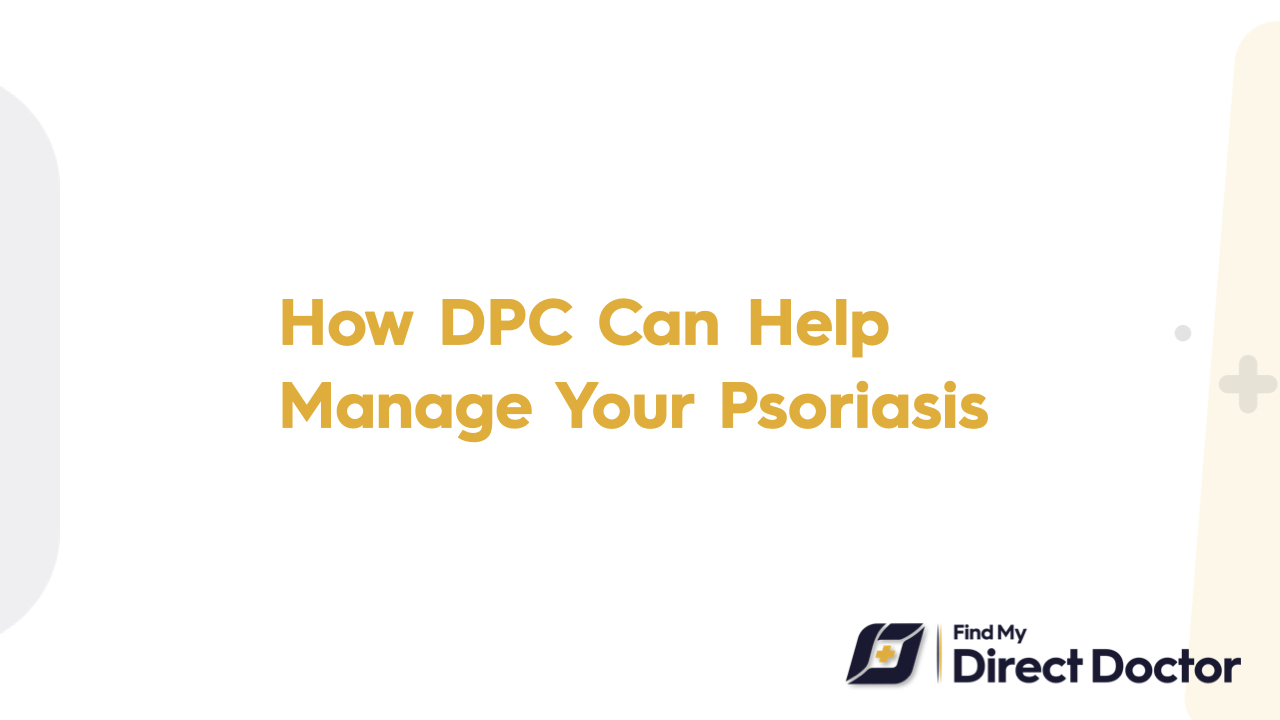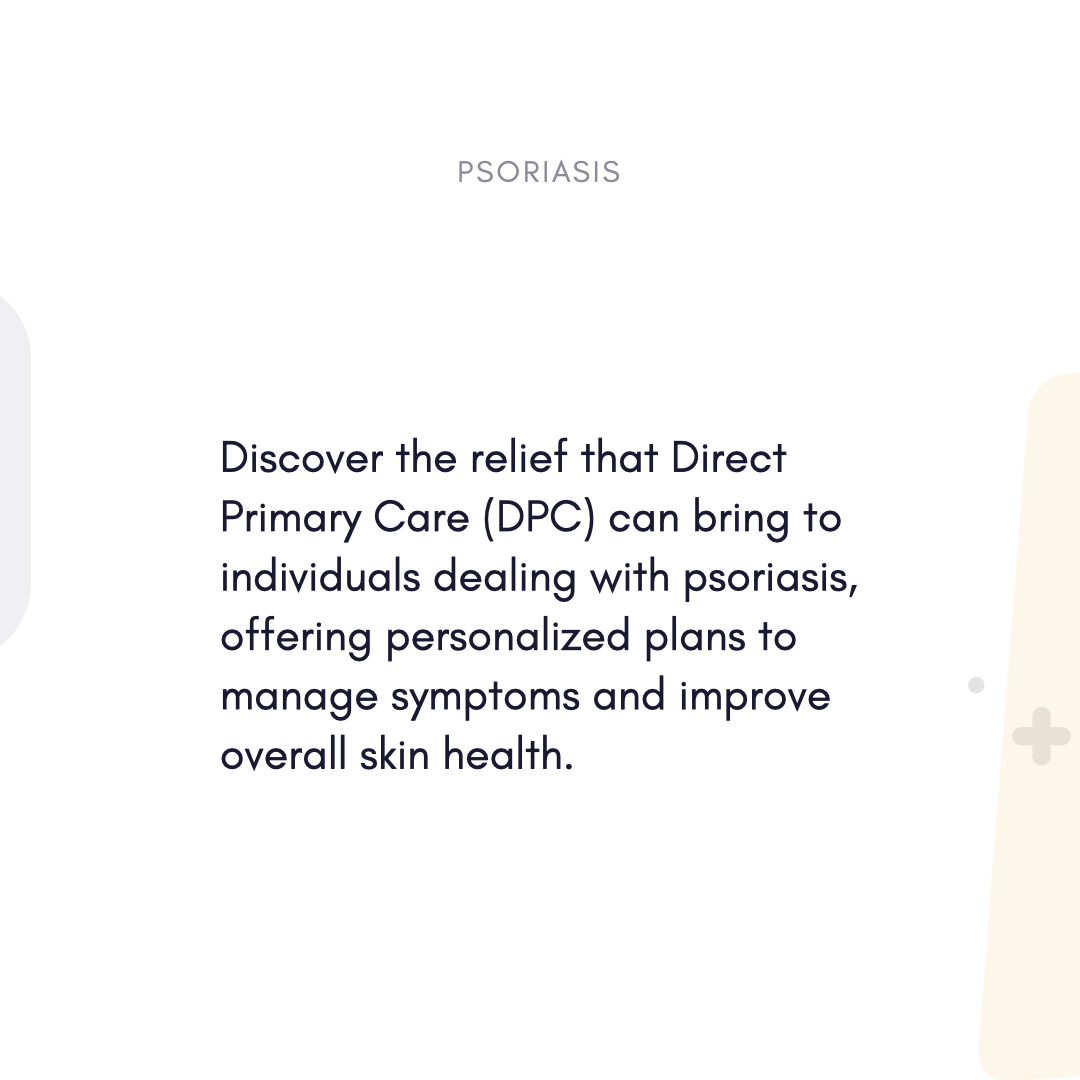Psoriasis and Direct Primary Care (DPC): Personalized Care for Clearer Skin and Better Living
Red, scaly patches that irritate constantly. The guilt about covering your skin. For 7.5 million Americans with psoriasis, this autoimmune disorder is daily struggle with pain, stigma, and comorbidities rather than only cosmetic. Although conventional treatment runs through visits quickly, there is hope: direct primary care (DPC) offers a caring, all-encompassing method to reduce inflammation and restore your skin.

Knowing Psoriasis
A chronic autoimmune disease, psoriasis causes fast accumulation of skin cells that results in:
- Thick, red patches with silvery scales (elbows, knees, scalp) called plaques
- Changes in nails: Pitting, cracking, or separation
- Arthritis: In thirty percent of cases swollen, painful joints
Stress, infections, alcohol, smoking: triggers Complications include heart disease, diabetes, depression. Early, aggressive treatment is stressed by the National Psoriasis Foundation to stop progression.
DPC Changes Everything Treatment of Psoriasis
Operating on a membership model usually 50 USD–150 USD/month, Direct Primary Care (DPC) provides unlimited access to your physician for a set fee. For those with psoriasis, this means no insurance hassles, no co-pays, and a care plan as distinct as your skin.
1. Fast Targeted Treatment and Diagnosis
The accessible model of DPC guarantees:
- Same-day assessments for joint pain or new flares.
- Inside-house biopsies Rule out fungal infections or eczema like mimics.
- Topical steroids, vitamin D analogues, or biologics are quick fixes.
2. Individualized, Guideline-Driven Treatment
DPC doctors design customized plans compliant with dermatology guidelines:
- Mild cases: UVB light treatment referrals, custom compounded creams.
- Moderate-severe: Previous author support supports biologics (such TNF inhibitors, IL-17 blockers).
- Psoriatic arthritis: Work with rheumatologists for JAK inhibitors or DMARDs.
3. Complete, Reasonably Affordable Support
By cutting medicine costs—wholesale pricing for methotrexate or apremilast—DPC lessens both emotional and financial burden.
- 24/7 telemedicine access: handling side effects or flares without ER trips.
- Lifestyle coaching: anti-inflammatory diets, stress management, smoking cessation.
DPC's advantages for Psoriasis sufferers
1. Unequal accessibility
- Photo consultations available 24/7 to evaluate changes in nails or new plaques.
- None of waiting times for prior authorizations or dermatologist referrals.
2. Customizable Interventions
- Scalp psoriasis: Medicated shampoos plus steroid treatments.
- Genital psoriasis: Tacrolimus ointment to prevent thinning from steroids.
3. Open Cost Transparency
- Membership consists in consultations, biopsies, and care coordination—no hidden costs.
- Typical savings: 2,000 USD+ yearly by skipping specialized co-pays and drug mark-ups.
Stories from Real-Life Success
- Case 1: Sarah, 28, underwent DPC stress management and UVB treatment after developing guttate psoriasis following a strop. In eight weeks, have clear skin.
- Case 2: James, 45, with psoriatic arthritis, received biologics at cost and recovered mobility with careful DPC/rheumatology treatment.
Questions: DPC and Psoriasis
- Q: Can DPC manage severe cases calling for biologics?
- A: Yes. DPC doctors watch for TB/reactivation, get prior authorization, and give in-office injections.
- Q: Without insurance, is DPC reasonably priced?
- A: Yes. On biologics (300 USD vs. 6,000 USD/month), members save 50–70% and avoid facility fees.
- Q: And what about complementary therapies?
- A: DPC doctors include Dead Sea salt soaks, turmeric pills, or acupuncture as extras.
Why DPC Is a Win for Psoriasis Patients
Emphasizing DPC's following of treatment guidelines, the American Academy of Dermatology supports:
- Precision: Customizing treatment for type of psoriasis—plaque, inverse, erythrodermic.
- Tools to monitor PASI scores and set off avoidance help empower you.
- Trust: Rushed, scattered visits are replaced by a consistent care team.
Take Back Your Confidence and Skin.
Psoriasis not has to rule your life. DPC helps you to find a partner who treats holistically, listens carefully, and prepares you—flawless or not—to face the world with confidence.






